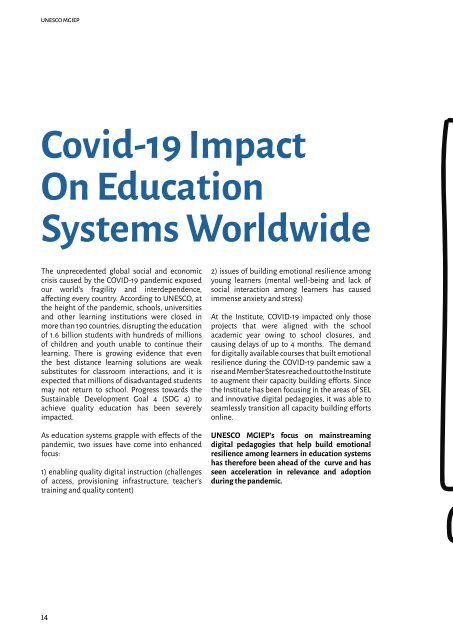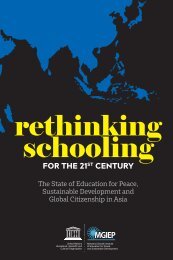UNESCO MGIEP's Annual Report 2020
2020 was indeed a very tough year for all of us. People across the globe were forced into the new normal: lockdowns, shutdowns, and travel bans. Families were separated. Millions fell sick and so many lives were lost. More than 1 billion children were affected by school closures. At UNESCO MGIEP, we analysed the impact of COVID-19 on our programs and pivoted our strategy to ensure that we continued to engage with educators, policymakers and the youth through various online initiatives to build a better, sustainable world for times to come.
2020 was indeed a very tough year for all of us. People across the globe were forced into the new normal: lockdowns, shutdowns, and travel bans. Families were separated. Millions fell sick and so many lives were lost. More than 1 billion children were affected by school closures. At UNESCO MGIEP, we analysed the impact of COVID-19 on our programs and pivoted our strategy to ensure that we continued to engage with educators, policymakers and the youth through various online initiatives to build a better, sustainable world for times to come.
Create successful ePaper yourself
Turn your PDF publications into a flip-book with our unique Google optimized e-Paper software.
<strong>UNESCO</strong> MGIEP <strong>Annual</strong> <strong>Report</strong> | <strong>2020</strong><br />
Covid-19 Impact<br />
On Education<br />
Systems Worldwide<br />
The unprecedented global social and economic<br />
crisis caused by the COVID-19 pandemic exposed<br />
our world’s fragility and interdependence,<br />
affecting every country. According to <strong>UNESCO</strong>, at<br />
the height of the pandemic, schools, universities<br />
and other learning institutions were closed in<br />
more than 190 countries, disrupting the education<br />
of 1.6 billion students with hundreds of millions<br />
of children and youth unable to continue their<br />
learning. There is growing evidence that even<br />
the best distance learning solutions are weak<br />
substitutes for classroom interactions, and it is<br />
expected that millions of disadvantaged students<br />
may not return to school. Progress towards the<br />
Sustainable Development Goal 4 (SDG 4) to<br />
achieve quality education has been severely<br />
impacted.<br />
As education systems grapple with effects of the<br />
pandemic, two issues have come into enhanced<br />
focus:<br />
1) enabling quality digital instruction (challenges<br />
of access, provisioning infrastructure, teacher’s<br />
training and quality content)<br />
2) issues of building emotional resilience among<br />
young learners (mental well-being and lack of<br />
social interaction among learners has caused<br />
immense anxiety and stress)<br />
At the Institute, COVID-19 impacted only those<br />
projects that were aligned with the school<br />
academic year owing to school closures, and<br />
causing delays of up to 4 months. The demand<br />
for digitally available courses that built emotional<br />
resilience during the COVID-19 pandemic saw a<br />
rise and Member States reached out to the Institute<br />
to augment their capacity building efforts. Since<br />
the Institute has been focusing in the areas of SEL<br />
and innovative digital pedagogies, it was able to<br />
seamlessly transition all capacity building efforts<br />
online.<br />
<strong>UNESCO</strong> MGIEP’s focus on mainstreaming<br />
digital pedagogies that help build emotional<br />
resilience among learners in education systems<br />
has therefore been ahead of the curve and has<br />
seen acceleration in relevance and adoption<br />
during the pandemic.<br />
14 15

















